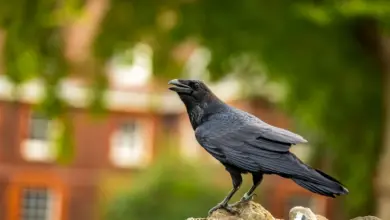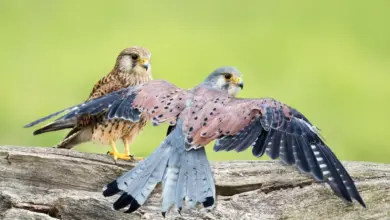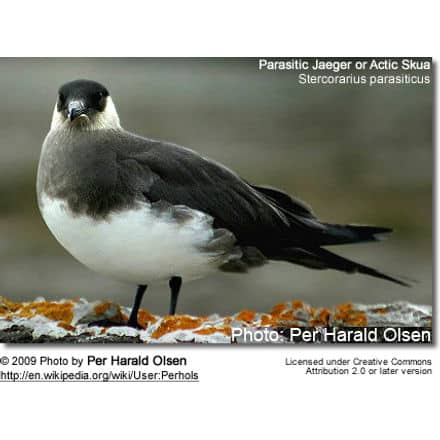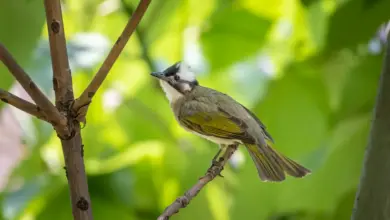Can Muscovy Ducks Fly?
Can Muscovy Ducks Fly? How Far, High & Fast?
Muscovies are different from other ducks in many ways, but what about flying? Can muscovy ducks fly, and if so, how far, high, and fast might they go? Can pet muscovies fly away? I look at all this in the article below.
Most species of ducks are excellent flyers.
Their bulky yet streamlined body allows ducks to cover great distances, especially species that migrate.
Wild Muscovy ducks do not undergo great migrations. However, they are efficient flyers.
Domesticated Muscovy ducks, on the other hand, are far less adept at flying.
Read on to discover more about the flying habits of Muscovy ducks.
Ducks of the World
Across the globe, there are thought to be as many as 130 different species of wild duck.
Perhaps the two most well-known species are the mallard, which can be found across Europe, Asia, and North America, and the Muscovy duck, which can be found in Central and South America.
These two species are important, as they are the ancestors of all domesticated duck species on Earth.
There are over 100 different domestic duck breeds. Only the domesticated Muscovy duck is a direct descendant of the wild Muscovy duck.
All other domesticated duck breeds have been bred from the wild mallard.
Most wild species of ducks are very capable flyers. There are, of course, some exceptions.
For example, the Indian Runner duck has lost the ability to fly. Instead, it runs along the ground in large flocks.
But we’re not here to talk about Indian Runners. This article is about Muscovies.
Can Muscovy Ducks Fly?
Yes, Muscovy ducks can fly.
That’s the short answer, at least.
But there is so much more to this question. We first need to look at whether the Muscovy duck is wild, domesticated, or feral.
So, let’s break it up.
Can Wild Muscovy Ducks Fly?
Wild Muscovy ducks can be found in forested areas of Central and South America.
Wild Muscovies tend to stay in heavily vegetated areas close to a water source.
Although Muscovy ducks are formidable predators themselves, they also happen to be prey for many forest-dwelling animals, such as cats, raccoons, and foxes.
As an anti-predator defense, wild Muscovies will fly away at the slightest hint of danger.
And where best to avoid predators? The tree canopy, of course.
Wild Muscovy ducks create their nests in tree cavities. The nesting holes can be as high as 60 feet off the ground.
They certainly can’t climb up a tree to a nest site, so they have no other choice but to fly.
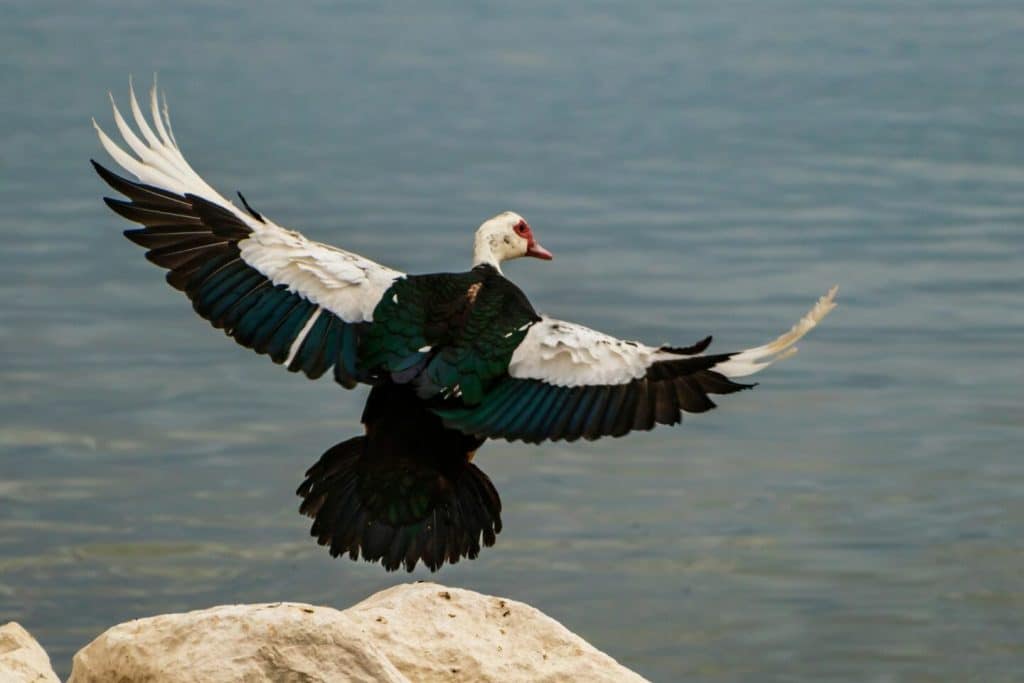
Despite being a large-ish waterfowl species, they are surprisingly agile.
Females are smaller than males and can maneuver densely vegetated areas with relative ease and at surprising speeds!
The fastest of all Muscovies are the juveniles. Due to their lighter build, and higher energy levels, it is thought young Muscovy ducks can reach speeds of up to 80mph!
Females are a close second with recorded speeds of up to 60 mph!
Unlike migrating duck species, a wild Muscovy duck cannot sustain flight for long periods of time.
Due to their larger size, it is simply too energetically costly for wild Muscovies to sustain prolonged flight.
While some species of waterfowl can maintain flight for over 3,000 miles, or 4,800 kilometers, the humble Muscovy rarely exceeds a single mile in flight.
Can Domesticated Muscovy Ducks Fly?
Unlike their wild counterparts, domesticated Muscovies are not as streamlined and cannot fly as well. However, they can still fly.
Muscovy ducks have been domesticated since before European colonists ventured to the New World.
Certain traits, such as larger breast size, have been actively selected during the domestication process. This is partly a result of the demand for meat production.
Consequently, domestic Muscovy ducks are bigger than wild Muscovies.
Today, domesticated Muscovy ducks are still used in egg and meat production.
The larger body size of domesticated Muscovy ducks has made it somewhat harder for these ducks to fly.

Moreover, they are a pretty content species of waterfowl, given the right conditions.
With enough space, adequate food, a water source, and a safe place to lay eggs, Muscovies will remain within a set boundary.
But, and it’s a big but, fail to adhere to the needs of a Muscovy duck, and you may find out that domestication does not inhibit the Muscovy’s ability to fly completely.
This, before we get onto feral Muscovies, brings us to our next point.
Can Domesticated Muscovies Fly Away?
As just mentioned, Muscovies are generally happy to remain in the same place, provided they have sufficient amenities.
However, an unhappy Muscovy will fly away to find better resources.
So, what do I mean by this?
Well, there are certain requirements needing to be met if you want to keep a flock of Muscovy ducks.
Deviate away from this, and you may find your Muscovies taking flight. Let’s take a look:
Food
Muscovy ducks are omnivorous. They need a variety of plant and animal proteins in their diet.
During the spring and summer months, if possible, allow your Muscovy ducks to free-range your yard. They will eat to their heart’s content.
You can also supplement their diet with kitchen scraps, but not processed carbohydrates, as well as nutrient-rich chicken feed.
Water
Being a species of waterfowl, Muscovies need to be close to a water source.
The water source does not need to be a large area, but it should be big enough for your Muscovies to bathe comfortably.
If you do not have a natural pond, you will need to change the water daily, sometimes twice daily, as Muscovies can get rather messy.
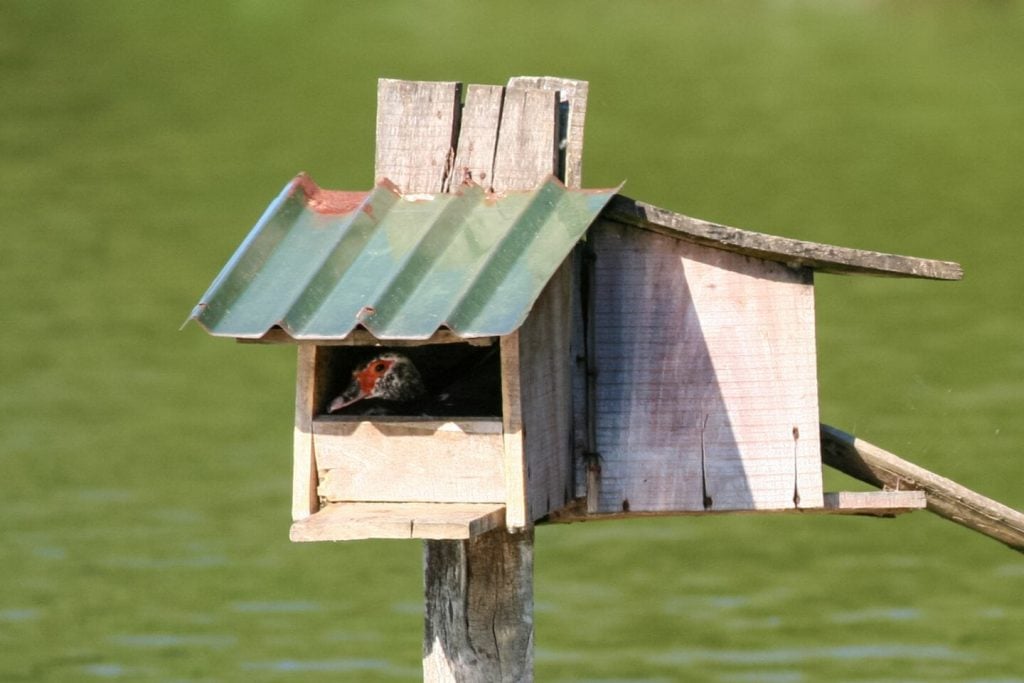
Space
Muscovy ducks can get territorial and aggressive – both with their own species and other species.
You should try and provide at least 15 square feet of space per duck to avoid potentially fatal conflicts.
Nest boxes
Muscovy ducks are hardy species and can tolerate a range of environmental conditions. You may find that they prefer to spend most of their time outside. This is totally fine during the day.
However, if you notice your Muscovy duck becoming broody, she wants to nest.
You must have at least one nest box per duck. Nest boxes should be slightly raised off the ground and provide a safe and protected space for your Muscovy to nest in peace.
How Can I Prevent My Muscovy Duck From Flying Away?
Failure to comply with any of these Muscovy requirements and you may find your ducks taking to the skies.
If you follow all of the above steps and you are still concerned your Muscovies may fly away, there are other avenues you can explore.
One of the most common ways bird keepers prevent their birds from flying away is by clipping their wings.
This can either be done yourself, if you know what you’re doing or by a trained specialist.
Wing clipping is a humane and painless procedure that inhibits flight.
Using sharp scissors, clip the primary feathers of your Muscovy duck one at a time.
However, be careful to avoid the blood feathers. A cut here could result in a lot of pain, and blood, for your duck.
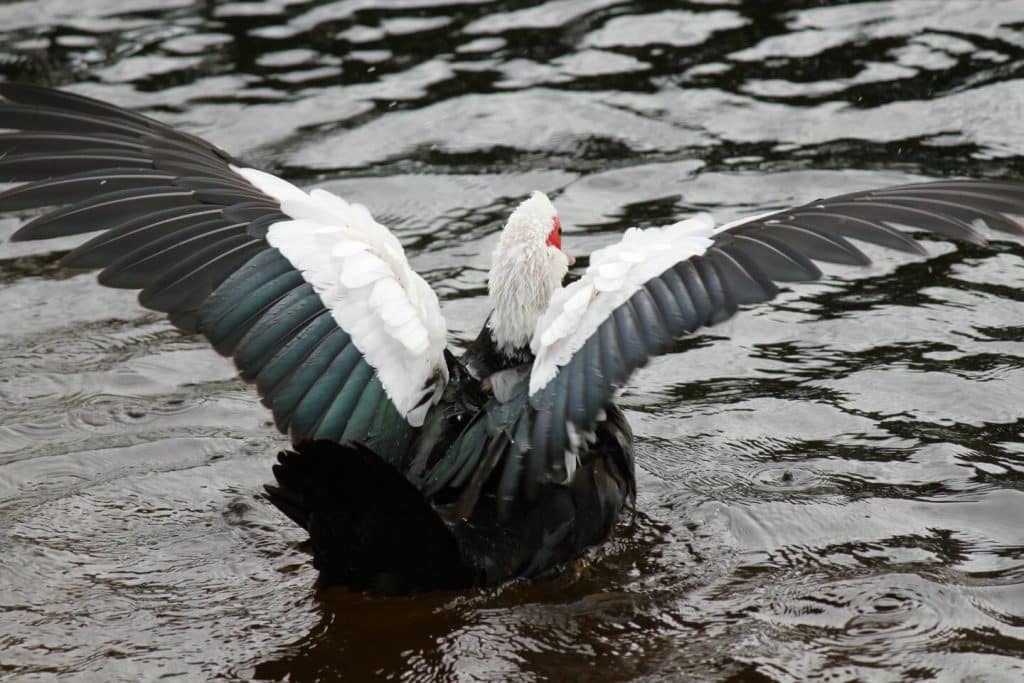
Blood feathers are distinguishable from the primary feathers of your Muscovy, as they have a pinkish hue, and you should be able to identify blood vessels.
Another easy way to ensure your Muscovies do not fly away is by keeping them within a coop or run, complete with a roof. This also ensures predators do not have access to them.
However, you should exercise caution over this method, and it should not be done unless you have a lot of space.
Muscovies are social and curious, and foraging increases their welfare. You should try and let your Muscovy ducks free range from time to time.
Can Feral Muscovy Ducks Fly?
Feral Muscovy ducks are domesticated Muscovies that have escaped captivity. Feral Muscovies have produced self-sustaining populations across the globe.
Feral Muscovy ducks have a similar body shape and size to domesticated Muscovy ducks, so their flying abilities are somewhat matched.
However, in the open environment, predation risks are much higher, and feral Muscovies are on constant alert. At the slightest sign of danger, feral Muscovies will fly in short bursts, keeping relatively low to the ground or water.
How High Do Muscovy Ducks Fly?
Unlike migrating waterfowl species, Muscovy ducks remain relatively close to a water source or ground as they fly for longer durations.
The exception, however, is when they fly up to their tree cavity to nest. This can be as high as 60 feet. However, it is rare for Muscovies to sustain flight at this height.
When departing a nesting hole, Muscovies simply take the easiest course of action. This is most often a gliding descent, as opposed to a continued flight path above the trees.
Frequently Asked Questions
Can a Muscovy duck fly away?
However, with enough food and water, as well as adequate space and availability of nesting boxes, most Muscovies will remain in one place.
Can you clip Muscovy ducks’ wings?
Wing clipping prevents your ducks from flying away. However, you will need to do this every 6 months.
Ensure you are confident. You can cause considerable pain and damage if you cut the wrong feathers!
Why is Muscovy not a duck?
Can Muscovy mate with ducks?
However, if there are not enough mating partners, a Muscovy duck will mate with other duck species. In domestic environments, Muscovy ducks mate with mallard species commonly.
This creates a hybrid mule duck that cannot produce fertile offspring of its own.
Wrap Up
All varieties of Muscovy ducks can fly. However, wild Muscovy ducks are the most efficient. They have been recorded flying distances close to a mile at approximate speeds of 60mph. Domesticated Muscovies will generally stay in one place. However, if conditions are not favorable, they may fly away.
To prevent Muscovy ducks from flying away, ensure they have enough food, water, and space. You can also clip their wings to inhibit flight.
Thank you for reading.


